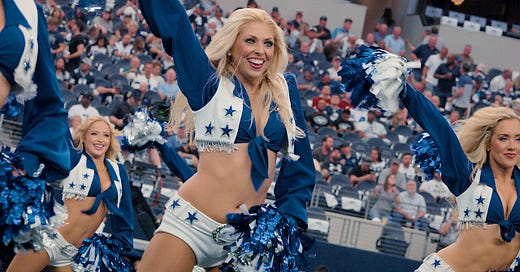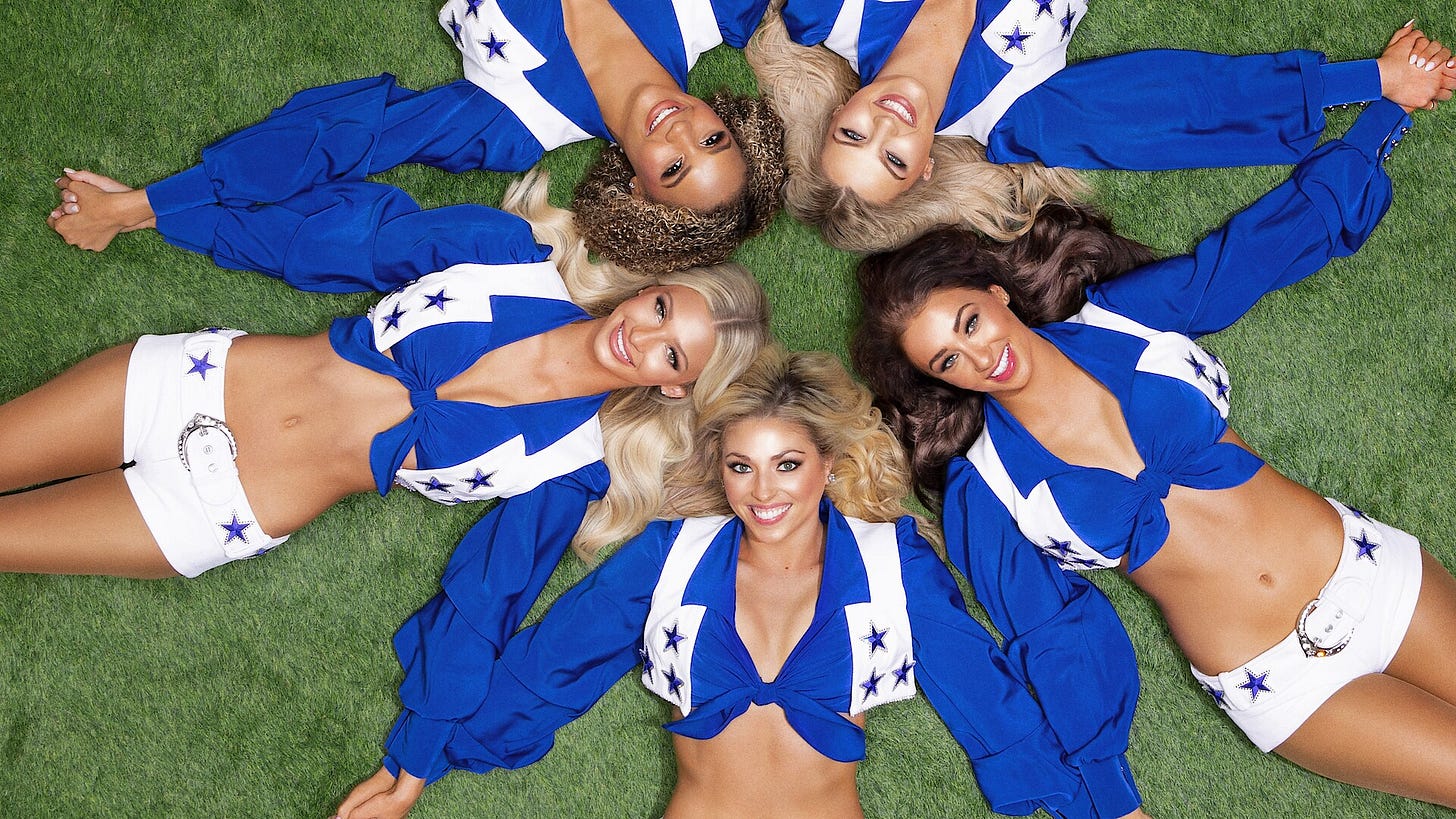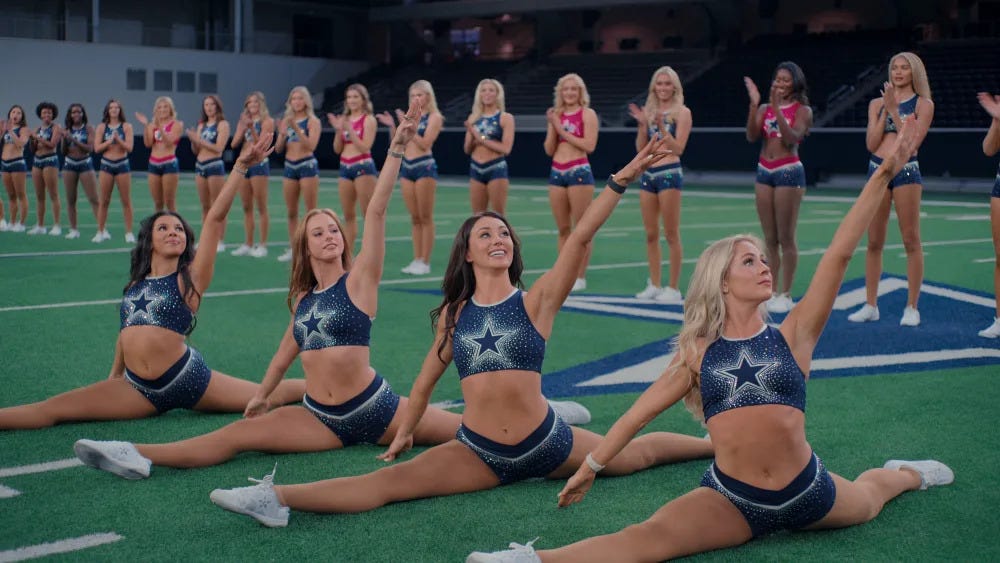I recently watched America’s Sweethearts: Dallas Cowboys Cheerleaders and it was a great example of how faux-feminist notions of ‘sisterhood’ are so pernicious.
The Dallas Cowboys franchise is valued at an insane $9 billion dollars USD, and their cheerleading squad pulls in big money. Netflix’s new doco follows cheerleading director Kelli Finglass as she cuts down a list of over 500 potential cheerleaders to create her All-American squad of 36.
A recurring theme in the doco is “sisterhood”. The Dallas Cowboys is owned by billionaire Jerry Jones, and in the doco we’re introduced to his nepo baby daughter Charlotte (DCC’s Executive VP), who oversees the cheerleading squad. After we see one cheerleader say she’s paid about as much as a Chick-fil-A worker, she declared: the cheerleaders aren’t “paid a lot” but get ✨sisterhood✨ instead.
At no point does Charlotte concede how little the franchise pays their cheerleaders, waffling on about intangible gifts the women receive instead. “The facts are, they don’t come here for the money. They come here for something that’s actually bigger than that to them,” she says. “It is about being a part of something bigger than themselves... It is about a sisterhood that they are able to form, about relationships that they have for the rest of their life.”
“The facts are, they don’t come here for the money. They come here for something that’s actually bigger than that to them… it is about being part of something bigger than themselves… a sisterhood that they are able to form.”
I wanted to scream. Sisterhood, famously, doesn’t pay your bills. And up until 2019, when the squad earned just $8 an hour and $200 for a game day, it definitely didn’t. It was only after former cheerleader Erika Wilkins sued the NFL franchise for lost wages that those rates were modestly raised. Compare that to the team mascot who apparently earns $60k plus commission per year, or a practice squad player pulling in a minimum of $12k per week.

All the female solidarity in the world won’t change the fact that these women are treated like a underclass, even when they are putting their bodies on the line. They’re at an increased risk of sexual assault, eating disorders, mental health issues and more, and yet, are convinced it’s a privilege to be badly paid – because you can’t put a price on sisterhood.
But the idea of sisterhood as something that unites all women is at best a naive dream. In Feminist Theory: From Margin to Center, bell hooks writes of the danger of this idea, that this concept of “common oppression” has historically been used in service of the “bourgeois white woman”.
“Women are divided by sexist attitudes, racism, class privilege, and a host of other prejudices… Divisions will not be eliminated by wishful thinking or romantic reverie about common oppression despite the value of highlighting experiences all women share,” she explains.
“Divisions will not be eliminated by wishful thinking or romantic reverie about common oppression despite the value of highlighting experiences all women share.”
I'm tired of being told to not criticise other women. As hooks explains, not every woman is oppressed in the same way, and some use 'sisterhood' and the notion of solidarity between women as a way to actually manipulate, exploit and oppress other women. Maybe that’s why the idea seems to thrive in this very white environment.
Not only does sisterhood not get you paid, it demands that women of colour act as white as possible. The first two Rookies shown in the documentary being cut from the squad were both Black, so I dread to think what goes down when the cameras are off. Notably, The Telegraph reports that a Black woman who auditioned for the squad in 2014 was told to straighten her hair so it “looked more feminine”, and her training in contemporary and jazz dance was also overlooked, with other dancers assuming she’d trained in “street or hip-hop”.
Then, there’s there’s the fact that the DCC seemingly doesn’t do much to protect these women from their very public positions. In Episode 6, Kelcey briefly opens up about a stalker who put an AirTag on her car, allowing them to find her home address. While she credited the squad’s support as key to getting her through, we hear zero mention of any help from the organisation.
“It really took away my sanity, to be completely honest. I was so scared. I mean, I was turning my back at every corner, I was watching every car that I saw multiple times and writing down license plates… it just makes you crazy,” she recalls.
While the cameras are rolling during a Dallas Cowboys game, Sophy is sexually assaulted on the field. She reports it to the police and the team rallies around her, but again, nobody brings up the elephant in the room: the DCC failing to keep their staff safe.
Notions of sisterhood aren’t just weaponised by the DCC to not pay these women a living wage – they take accountability away from them for providing safe workplace. The most recognisable DCC move is the jump split, which involves the women linking up to do a bunch of high kicks, before jumping and landing on the ground in the splits. It makes me flinch every time I see it, and it turns out it wreaks havoc on your body. One ex-DCC member tells the camera she’s had 12 orthopaedic surgeries in the last six years. But I guess… sisterhood?
The cheerleaders are actively bringing money into the organisation, which is what makes this low-pay situation even more outrageous. But by virtue of this being work done exclusively by women, it’s seen as low-value. The women give their labour to photo ops and events, photos of them are plastered over official calendars, and there’s even an official Dallas Cowboys Cheerleader Barbie Doll. So where, I ask, is their money?
Netflix’s documentary is a reminder that sisterhood is at best a Band-Aid: it’s faux-feminism wrapped in a bow, weaponised so that it can be used to exploit and oppress women. Corporations can hide behind it to justify unfair work practices, to continue bettering themselves and lining their pockets, but ultimately these are women being paid dust. The romanticised ideal of sisterhood was never meant to be an end in itself, and it’s never, ever going to save us.
Rachel Choy is a cat lover, journalist, and co-founder of The Offcut. You can see how cute her cats are on @thekiwicouple.







